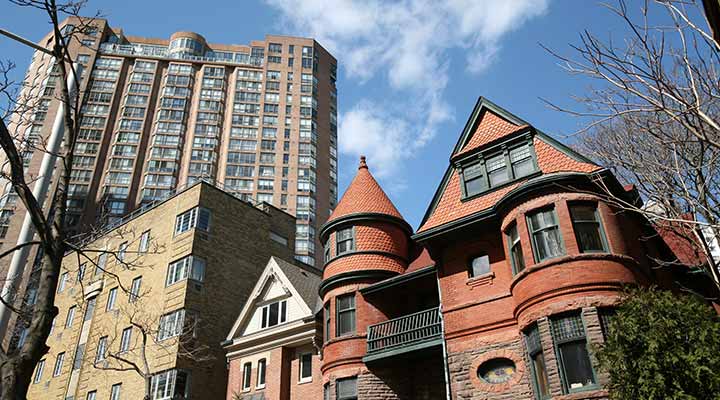In 2016, UNITE HERE’s Local 75 filled Trinity-St. Paul’s United Church with more than 600 rank and file members and allies to celebrate the 10th anniversary of the Hotel Workers Rising campaign, a continent-wide struggle that turned precarious work into good jobs with pensions and benefits. While wages were central to the campaign then, it is not the only issue that moves Local 75 members today.
Members have since become much more concerned about the rising cost of living. Housing costs, we were told, is the single biggest issue that keeps members up at night. Winning wage increases from one faction of capital, only to have to hand more and more of it over to another is not a win, but a loss. The fight for a better life cannot be reduced to workplace organizing, but has to include areas where unions don’t venture very often, including the realm of affordable housing. Land and labour, rent and wages, we are reminded, are internally related parts that define the exploitation of workers under capitalism.
Impact of Airbnb on the Rental Housing Market
Moving on to the issue at hand. Airbnb. A company that emerged on the scene not long ago.
On the surface, Airbnb is an online service that connects homeowners with guests who are looking for a place to stay. It brokers the connection and takes a cut from the host and the guest for each nightly booking. Airbnb says that its hosts are mainly ordinary people who occasionally rent out a spare room to generate a modest amount of income to help make ends meet. It bills itself as a company that “democratizes capitalism.”
In reality, Airbnb enables a shadow economy of absentee landlords and want-to-be property managers who turn residential housing stock into full-time ghost hotels. Rather than democratizing capitalism, research indicates, unchallenged, that Airbnb produces the same tendencies that define the broader economy, chief among them, the tendency towards the concentration and centralization of capital. As our Toronto study shows, a small minority of hosts control a disproportionately large share of Airbnb’s inventory and generate the majority of the company’s revenue.
The problem for hotel workers is this: Airbnb is a venture capital-fed, $31-billion “sharing” economy giant that thrives by operating in legal grey areas. Airbnb uses tax regimes in Ireland and offshore tax havens like Jersey to avoid paying taxes in Canada. Most importantly, Airbnb runs the world’s largest hotel in a vertically disintegrated manner. It spreads its ghost hotel inventory across residential communities, condo towers and apartment buildings. None of this inventory conforms to the same rules, standards and tax laws that the regulated hotel industry follows. Consequently, Airbnb is cheap and extremely popular among budget travelers, it lowers hotel room occupancies and leads to a reduction of hours for hotel workers.
But that’s not all. Airbnb also contributes to the city’s housing crisis. As City of Toronto staff has demonstrated, using Airbnb’s own data, 3,200 homes became fodder for ghost hotels in 2016 alone. Other studies suggest that Airbnb’s consumption of housing stock is even more voracious. Anyone who has recently been looking for a place to live in Toronto has experienced the absurd costs and the lineups of people when places do come up for rent. The housing market, no question, favours landlords over renters. While Toronto endures one of the worst affordable housing crises in history, Airbnb effectively incentivizes landlords to turn long-term rental stock into ghost hotel suites. As a result, Local 75 members not only suffer from the ill effect Airbnb has on the hotel business, but from its impact on the housing market. Our members are hit twice: they lose wages and affordable housing options close to where they work.
Fairbnb Coalition Fights Back
For Local 75, there is only one way to respond to Airbnb’s considerable impact on hotel workers in the city. To fight back, and to win.
In real political terms, this fight translates into advocacy for regulation or reform. For this purpose, Local 75 started the Fairbnb.ca campaign by bringing together groups interested in protecting Toronto’s housing market from being ravaged by property entrepreneurs and ghost hotel operators. Through this coalition, we not only build meaningful relationships with supporters and allies, but we reconcile the struggle for good jobs and affordable housing by extending our fight from bargaining tables to the realm of city planning and urban politics.
